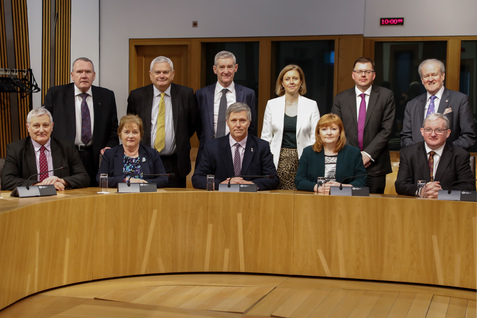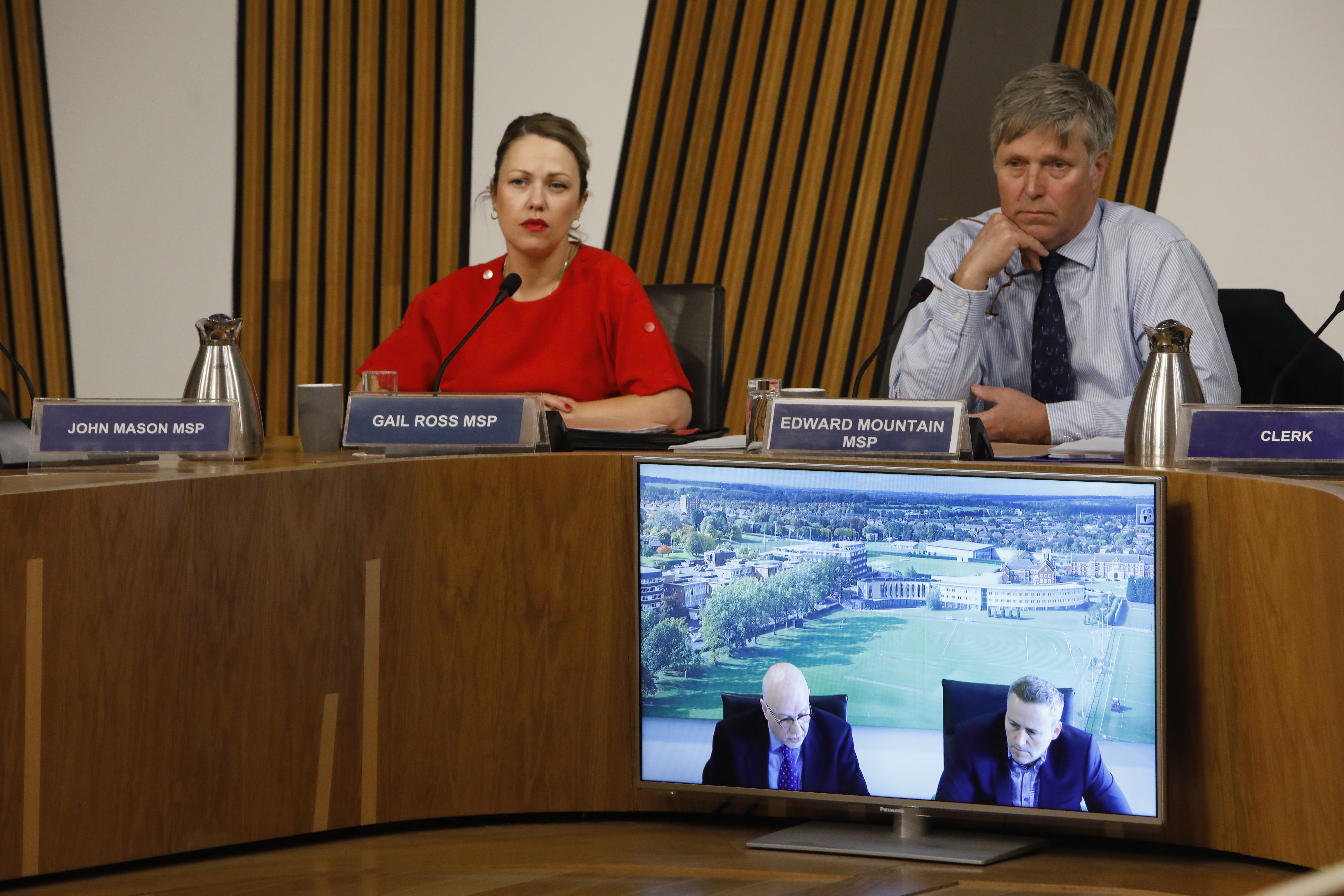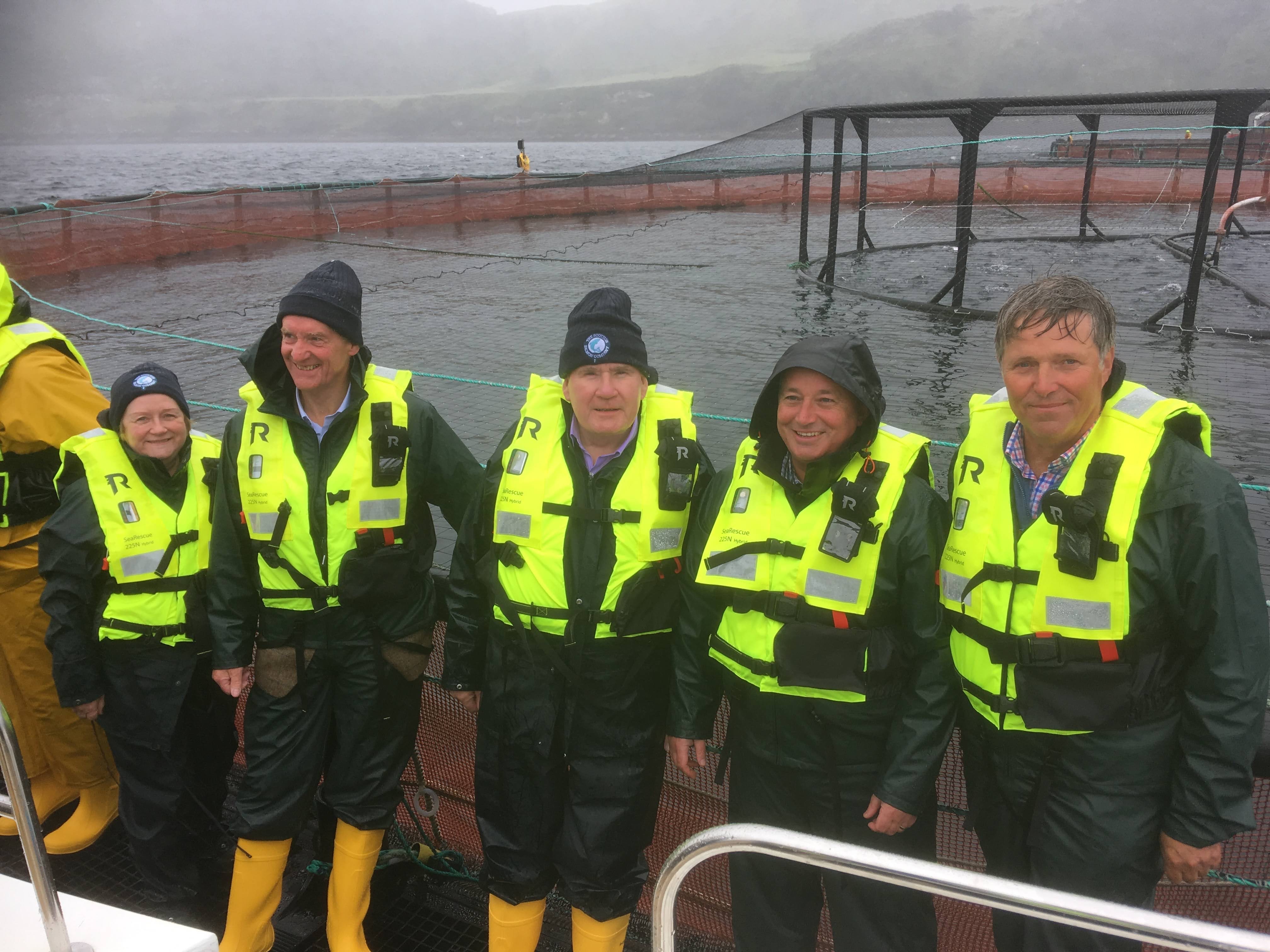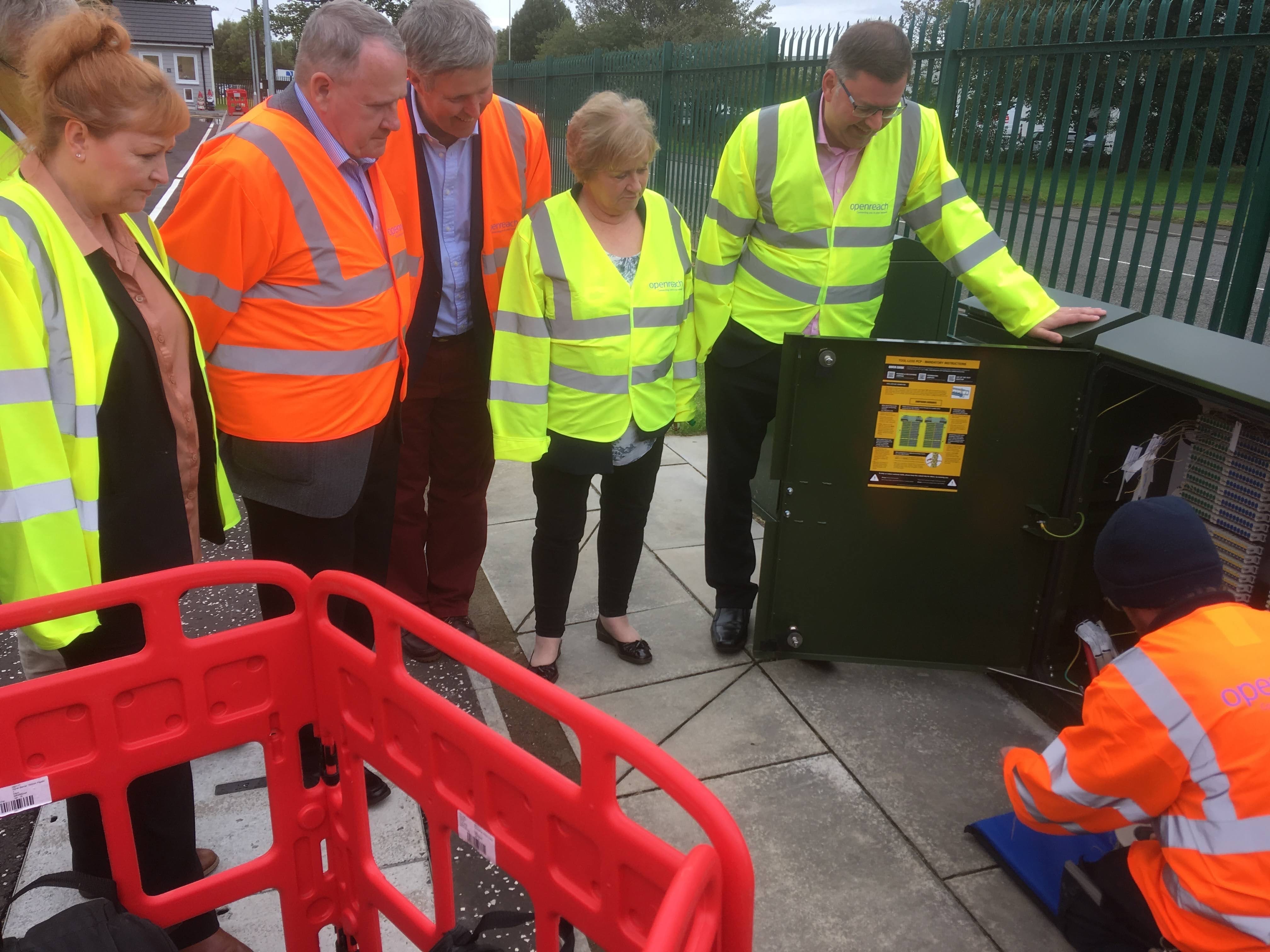Annual Report of the Rural Economy and Connectivity Committee for 2019/20
Introduction
This report covers the work of the Rural Economy and Connectivity (REC) Committee during the parliamentary year between 12 May 2019 and 11 May 2020.
The role of the Committee is to scrutinise the Scottish Government's policies and expenditure on a number of matters including agriculture, forestry, fisheries and aquaculture, crofting, transport (including major infrastructure projects), food and drink, digital connectivity and island issues.
Meetings
During the parliamentary year, the Committee met 30 times. Of these meetings, 21 were partly in private. Items taken in private were to consider the Committee's work programme, approach papers, draft reports and to review evidence.
Agendas and minutes of all meetings of the Committee, including details of matters considered in private, are published on the Parliament's website.
Membership changes
The membership of the Committee changed during the period covered by this report, as follows:
John Mason (until September 2019) was replaced by Angus MacDonald
Gail Ross (until September 2019) was replaced by Emma Harper
Jamie Greene (until March 2020) was replaced by Rachael Hamilton

Covid-19
The Covid-19 (Coronavirus) outbreak impacted on the Committee's work in March and April 2020. The resulting restrictions meant that non-critical Committee business was postponed.
In April 2020, the Committee met informally to discuss its approach to scrutinising matters within its remit relating to the implications of the Covid-19 outbreak for transport and the rural economy in Scotland. It agreed to take evidence on 13 May 2020 from the Scottish Government on these urgent issues.
Legislation
This section covers the Committee's scrutiny of primary legislation, legislative consent memorandums for UK primary legislation and secondary legislation.
Transport (Scotland) Bill
The Transport (Scotland) Bill was introduced by the Cabinet Secretary for Finance and Constitution on 8 June 2018. The Bill was introduced to -
make provision for low emission zones;
make provision for and in connection with the powers of local transport authorities in connection with the operation of local bus services in their areas;
make provision about arrangements under which persons may be entitled to travel on local bus and other transport services;
prohibit the parking of vehicles on pavements and prohibit double parking;
make provision in connection with the status of the office of the Scottish Road Works Commissioner, the Commissioner's functions and the regulation of road works;
make provision in connection with regional Transport Partnerships and to adjust the number of members on the British Waterways Board.
During the period covered by this report, the Committee considered the Bill at Stage 2 (the first stage where changes can be made to Bills, which are called amendments). Through an online survey, the Committee sought views on the policy intention behind Stage 2 amendments proposing the creation of a workplace parking levy. The Committee also took oral evidence on this topic on 22 May 2019 and 29 May 2019. The Committee considered Stage 2 amendments during June 2019.
Transport (Scotland) Bill, evidence session 22 May 2019.
The Bill was debated by the Parliament over two days at Stage 3 (the next stage of the Bill where changes can be made by members or the Scottish Government 'amending' the Bill), where there was extensive discussion, in particular, on the proposed workplace parking levy. Parliament passed the Bill on 10 October 2019 and it received royal assent on 15 November 2019.
Restricted Roads (20mph Speed Limit) Bill
The Restricted Roads (20mph Speed Limit) (Scotland) Bill was introduced by Mark Ruskell MSP (the member in charge) on 21 September 2018. The Bill aimed to reduce the default speed limit on restricted roads, generally residential streets and minor roads in urban areas, from 30mph to 20mph.
The Committee supported the aim of the Bill to seek to widen the implementation of 20mph zones in Scotland with the objective of reducing death and serious injuries on roads. However, the key consideration for the Committee was to determine whether the Bill's proposal to introduce a 20mph speed limit on all restricted roads in Scotland by default was the most effective way to deliver a significant increase in 20mph zones.
Following consideration of the evidence provided, the majority view of the Committee was that the default, 'one-size-fits all' approach proposed in the Bill was not appropriate, as it would not give local authorities the flexibility to devise 20mph limits that they consider appropriate for their areas.
Three members of the Committee dissented from this position as they were of the view that the current inconsistent use of 20 mph speed limits is confusing and undermines road safety.
The Committee also highlighted to the Scottish Government that the existing processes which local authorities must follow to implement 20mph speed limits are cumbersome and resource-intensive and should be more straightforward.
Consequently, the Committee welcomed work by the Scottish Government to consider ways in which these processes can be simplified or improved. The Committee was of the view that the outcome from this work should be a more streamlined and efficient mechanism which will allow local authorities to implement 20mph zones more easily in those areas they consider appropriate.
In its Stage 1 report, published on 31 May 2019, the Committee indicated that it was unable to recommend to the Parliament that the general principles of the Bill be agreed to.
Following a debate in the Chamber and having considered the Committee's report, the Parliament did not agree to the general principles of the Bill and the Bill subsequently fell on 13 June 2019.
South of Scotland Enterprise Bill
On 24 October 2018, the South of Scotland Enterprise Bill was introduced by the Cabinet Secretary for the Rural Economy, to establish a South of Scotland Enterprise agency and to provide for its functions. The progress of the Bill at Stage 1 was covered by the Committee's previous annual report. Stage 2 consideration of the Bill was completed by the Committee on 15 May 2019.
The Bill was passed by Parliament on 5 June 2019 at Stage 3, and received royal assent on 12 July 2019.
Agriculture (Retained EU Law and Data) (Scotland) Bill
The Agriculture (Retained EU Law and Data) (Scotland) Bill was introduced by the Cabinet Secretary for the Rural Economy on 6 November 2019. The Bill is intended to provide the Scottish Ministers with regulation-making powers to amend or replace the European Union (EU) Common Agricultural Policy (CAP) elements of retained EU law in Scotland, and to provide new powers for the collection and processing of agricultural data.
In the period from November 2019 to January 2020, the Committee conducted six evidence sessions on the Bill, hearing from the Cabinet Secretary for the Rural Economy and Tourism, Scottish Government officials, organisations focused on data or research, agriculture industry representatives, and stakeholders with interests in rural policy or wider agricultural policy. 14 responses to the Committee's call for written views were also received .
The Committee agreed its Stage 1 report on the general principles of the Bill on 26 February 2020.
The Stage 1 debate on the Bill took place on 5 May 2020, with Stage 2 consideration expected to take place in June 2020, outwith the period covered by this report.
UK Parliament Legislation
During the parliamentary year, the Committee considered and reported on one Legislative Consent Motion (LCM) on the Direct Payments to Farmers (Legislative Continuity) Bill which was introduced to the House of Commons on 9 January 2020. The Bill was intended to convert the EU legislation governing the 2020 Common Agricultural Policy (CAP) direct payment schemes into domestic law, therefore providing a UK wide legal basis for the direct payment schemes to continue in the 2020 claim year.
The Bill was on an expedited timescale due to the UK's exit from the European Union, the UK Government having stated its intention that the Bill, and some of the subordinate legislation to be made under it, should be in force by 31 January 2020.
The Committee considered the Legislative Consent Memorandum (LCM) on 15 January 2020 and agreed to recommend in its report to the Parliament that consent should be given to the UK Parliament to legislate on these issues.
Subordinate Legislation
During this parliamentary year the Committee considered 28 Scottish Statutory Instruments of which 23 were negative, 4 were affirmative and 1 was subject to no parliamentary procedure. Several of these statutory instruments were related to the UK's exit from the European Union.
The Committee also scrutinised several consent notifications where the Scottish Government sought consent for the UK Government to legislate in the UK Parliament on matters which are within the legislative competence of the Scottish Parliament. This applied to secondary legislation arising from the UK's exit from the European Union, including on direct payments for farmers.
Inquiries
The Committee agreed to hold an inquiry into the construction and procurement of ferry vessels in Scotland at its meeting on 30 October 2019.
REC Committee members visit Ferguson Marine shipyard, 24 February 2020
The remit of the inquiry was to identify and address current and future challenges and opportunities in the procurement of new vessels to support Scotland’s ferries network.
As part of this work, the Committee agreed to consider the updated timetable and costs associated with the completion of two new hybrid ferries to serve the Clyde and Hebrides ferries network, set out in the Ferguson Marine Programme Review Board report, which was published by the Scottish Government on 18 December 2019.
The Committee took evidence on the inquiry between January and March 2020. Members visited the Ferguson Marine shipyard in February 2020, where they met with the senior management team and employees. The inquiry is ongoing at the time of publication of this report, having been interrupted due to the (Covid-19) pandemic.
Other evidence sessions and visits
The Committee also held one-off topical evidence sessions and went on external visits on various subjects within its remit, including:
Transport
Agriculture and Fisheries
Implications for Scotland of the UK leaving the European Union
Digital Connectivity
National Islands Plan
Transport
The Committee has looked at a broad range of transport issues during the reporting year, including bus, road, rail, and ferry services and active travel.
The Committee took evidence on matters relating to the performance of rail services in Scotland during the 2019-20 reporting year. On 4 September 2019 the Committee took evidence from ScotRail and Network Rail Scotland on the ScotRail remedial order issued by the Scottish Government on 8 February 2019 relating to passenger satisfaction targets, and also sought an update on progress on a remedial plan related to a breach of performance levels. The Committee continued its scrutiny in this area with a transport update on 11 September 2019 from the Cabinet Secretary for Transport, Infrastructure and Connectivity and the Minister for Energy, Connectivity and the Islands.
The Committee also received regular updates from Scottish Ministers on major transport infrastructure projects. On 19 February 2020, The Committee held a specific evidence session with the Cabinet Secretary for Transport, Infrastructure and Connectivity on the Queensferry Crossing, following its closure on safety grounds due to falling ice. The Committee questioned the Cabinet Secretary on the impact of the closure, the reasons behind it and potential solutions .
Agriculture and Fisheries
On 6 November 2019, the Committee took evidence from the Cabinet Secretary for the Rural Economy and Tourism as part of a series of regular updates to monitor current issues relevant to the agriculture and fisheries sectors, including the impact of Brexit for each sector. In addition, the session covered related Scottish and UK legislation, Common Agricultural Policy (CAP) Payments, the climate emergency and future agriculture and fisheries policy.
On 2 September 2019, the Committee visited a salmon farm and feed plant in Kyleakin, Skye, as part of its ongoing monitoring of issues on salmon farming in Scotland, following its Committee inquiry on this subject in 2018.

Implications for Scotland of the UK leaving the European Union
The decision of the United Kingdom to leave the European Union will have significant ramifications for policy areas within the Rural Economy and Connectivity Committee’s remit.
The Committee held two evidence sessions on the impact of Brexit on the rural economy. It took evidence on 18 September 2019 from a range of agriculture, land management and environmental stakeholders, followed by evidence on 9 October 2019 from representatives of the fisheries sector in Scotland.
Over and above these specific sessions, the Committee continued to consider the implications of Brexit for agriculture, fisheries, transport and digital connectivity when taking evidence on these areas of its remit.
Digital connectivity
The Committee continued to scrutinise the Scottish Government on its commitment to achieving 100% superfast broadband in Scotland through the Reaching 100% (R100) programme and other schemes. The Committee also monitored progress in the delivery of improvements in mobile digital connectivity, using 4G and 5G technology.
The Committee took evidence from the Minister for Energy, Connectivity and the Islands on 30 October 2019 and 29 January 2020 on digital connectivity, receiving updates on the development of the R100 programme and interaction with UK superfast broadband initiatives. The Committee also visited the BT Openreach regional training school in Livingston on 9 September 2019.

National Islands Plan
The Committee agreed its approach to scrutinising the proposed National Islands Plan at its meeting on 9 October.
The proposed Plan was laid in Parliament on 3 October 2019, and is a component of the implementation of the Islands (Scotland) Act 2018, which the Committee had previously scrutinised.
The Committee wrote to the Minister for Energy, Connectivity and the Islands setting out its recommendations on the Plan on 20 November 2019. The Committee called for a number of points to be addressed in the plan, including the inclusion of SMART objectives and the strengthening of the climate change section of the plan to reflect the Scottish Government’s acknowledgement of a climate change emergency.
Financial scrutiny
At its meeting on 26 June 2019, the Committee agreed to undertake financial scrutiny on the current approach to roads maintenance in Scotland and the adequacy of related funding levels.
The Committee took evidence from engineering and technical interests on 25 September 2019 and from road users and decision makers on 2 October 2019.
The Committee received 65 written responses to its call for written evidence. The responses were analysed in a summary of evidence.
On 21 November 2019, the Committee wrote to the Cabinet Secretary for Transport, Infrastructure and Connectivity setting out its conclusions and recommendations to the Scottish Government. The Committee raised concerns about a £1.2 billion backlog in the maintenance of trunk roads and a £1.8 billion backlog in local road maintenance. The Committee called for roads maintenance to be given a higher priority in the National Transport Strategy and the revised Strategic Transport Projects Review; and for substantial additional investment to be made to support the maintenance of Scotland's roads.
The Cabinet Secretary for Transport, Infrastructure and Connectivity responded to the Committee's recommendations on 6 February 2020.
Following the publication of the Scottish Budget 2020-21, the Committee took evidence from both the Cabinet Secretary for the Rural Economy and the Cabinet Secretary for Transport, Infrastructure and Connectivity on 19 February 2020.
Petitions
During this reporting year, the Committee has considered petitions PE1616, PE1703 and PE1715.
As part of its consideration of the Transport (Scotland) Bill, the Committee agreed to take into account petition PE1616 by John S Shaw, calling on the Scottish Parliament to urge the Scottish Government to make it an offence to park in front of a dropped kerb.
in its Stage 1 report, the Committee agreed to recommend that such an offence should be introduced by the Bill. The Scottish Government subsequently brought forward proposals for the prohibition of parking in front of dropped kerbs at Stage 2 of the Bill and these were agreed by the Committee. The Committee subsequently closed the petition, on the basis that its objectives had been met.
PE1703 calls on the Scottish Parliament to urge the Scottish Government to deliver superfast broadband internet access to every household and business in Scotland, particularly in rural areas, before 2021. The Committee has agreed to consider the issues raised in the petition as part of its ongoing scrutiny of the Scottish Government's R100 superfast broadband programme.
PE1715 calls on the Scottish Parliament to urge the Scottish Government to ensure that the salmon farming industry solely utilises a closed-containment method with full water filtering in Scottish waters. The Committee has agreed to consider the petition as part of its scrutiny of the implementation of recommendations from its previous inquiry into salmon farming in Scotland.
Equalities and human rights
The Committee mainstreamed equalities and human right issues throughout its work in the parliamentary year.
The Committee heard from the Mobility and Access Committee for Scotland on various transport strands of its work to ensure it was aware of the specific needs of people with disabilities. Perspectives from young and older people are also important to the Committee. In this regard, the Scottish Youth Parliament and the Scottish Older People's Assembly held workshops to discuss their views on broadband access, to contribute towards the Committee's ongoing scrutiny of this area.
Gender diversity information
Research indicates that of the 162 people who gave views to the Committee this year, 76% were male and 24% were femalei. This overall figure includes appearances by Cabinet Secretaries and Ministers. The Committee actively encourages diversity in its invitations to those who appear before it to provide evidence.
